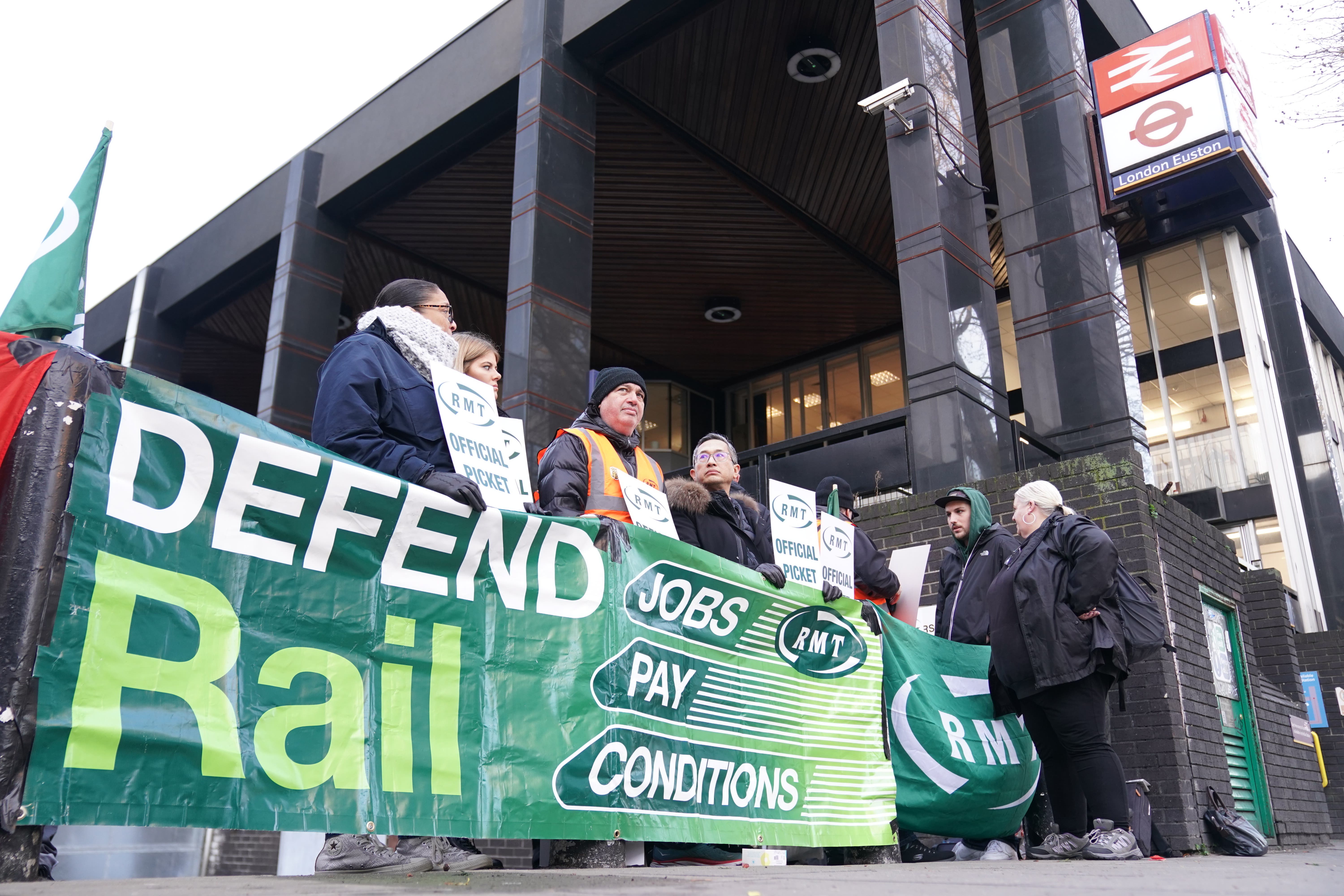Lawyers predict legal challenges to minimum service levels legislation
One of the industries targeted by ministers is the railways, which was hit by another strike on Friday by members of the Rail, Maritime and Transport.

Employment lawyers are predicting there will be a legal challenge to the government’s controversial announcement of legislation to ensure minimum levels of service during strikes.
Unions reacted with fury to the move, saying it would do nothing to resolve the current wave of strikes sweeping the country.
One of the industries targeted by ministers is the railways, which was hit by another strike on Friday by members of the Rail, Maritime and Transport union.
Richard Arthur, head of trade union law at Thompsons Solicitors said there were “very serious legal question marks” around the government’s proposals.
The government is referring to minimum ‘safety levels’ and we anticipate legal challenge around what they are and who defines them
He added: “The measures go further than the minimum service levels envisaged by the Transport Strike (Minimum Service Levels) Bill published in October.
“The Human Rights Memorandum accompanying that Bill set out reasons why minimum service levels were not justified in fire services, health settings and education and yet this is what is being proposed.
“The government is referring to minimum ‘safety levels’ and we anticipate legal challenge around what they are and who defines them.
“The introduction of minimum safety levels does not comply with the United Kingdom’s legal obligations under Convention No.87 of the International Labour Organisation on Freedom of Association and Protection of the Right to Organise, and Article 11 of the European Convention on Human Rights.
“The legal challenges when they come – and they will – are not something that the government can sidestep saying ‘Brexit has set us free’. The breaches will be of conventions that the government has signed up to that come from the Council of Europe and the International Labour Organisation, not the European Union.”
Tom Long, employment partner at law firm Shakespeare Martineau, said: “While this is the latest attempt in a series of governments since 2010 to restrict the right to strike, the proposed legislation could have a relatively short lifespan.
“Aside from the fact that trade unions will be unlikely to accept it without a fight, it may take months to go through parliament and even if passed, the Labour Party have been vocal about their intention to repeal it if they are elected in the next two years.
“Designed to protect minimum service levels, the current legislation is limited to what the Government considers “important public services”, such as nurses and the fire service, so will have no immediate effect on businesses outside of these areas.
“However, it could be argued that those “important public services” are areas where the Government could be held responsible for the knock-on effects of strike action, for example delayed operations and hospital appointments.
“This announcement will naturally garner a lot of attention, especially with the country in the midst of strike action across a number of sectors.
“However, with trade unions already threatening a potential legal challenge through the courts, it remains to be seen whether the Prime Minister’s bold plans will translate into reality.”
David Hopper, employment partner at law firm Lewis Silkin, said the proposed legislation will not resolve the current unrest.
“It will take time to be enacted and there is no guarantee that it will make it past the House of Lords, as only transport strikes are covered by the government’s 2019 manifesto commitment to introduce minimum service levels.
“If it does become law, it may still not be effective without numerous additional sets of regulations, industry agreements and even court rulings, which would actually set the particular minimum standards.
“Even then, unions can be expected to resist the new requirements and will almost certainly challenge any enforcement action against them on human rights grounds.
“Minimum service levels also actually risk prolonging strikes, by preventing unions from being able to generate sufficient leverage through causing disruption to secure their demands.
“The Labour Party has already promised to repeal the legislation if enacted. So, with the polls as they are, these reforms may be of no lasting significance in any event.”
The government said it will introduce a Bill in Parliament in the coming weeks to ensure vital public services will have to deliver minimum safety levels during industrial action.
Minimum safety levels will be set for fire, ambulance and rail services and the government will consult on the adequate level of coverage for these sectors.
For other sectors covered in the Bill, which includes health services, education, nuclear decommissioning, other transport services and border security, the government said it expects to continue to reach voluntary agreements, and would look to consult only on minimum safety levels should these voluntary positions not be agreed.
As well as protecting the freedom to strike, the government must also protect life and livelihoods
Business Secretary Grant Shapps said: “We hugely value the work of our public services and we’re reaching out to unions to have an honest conversation on pay, conditions and reform.
“Industrial action is disruptive for everyone – from people relying on essential services to get to work or care for their family to hard-working business owners whose sales suffer. It also costs those striking at a time when family budgets are tight.
“As well as protecting the freedom to strike, the government must also protect life and livelihoods.
“While we hope that voluntary agreements can continue to be made in most cases, introducing minimum safety levels – the minimum levels of service we expect to be provided – will restore the balance between those seeking to strike and protecting the public from disproportionate disruption.”
Bookmark popover
Removed from bookmarks